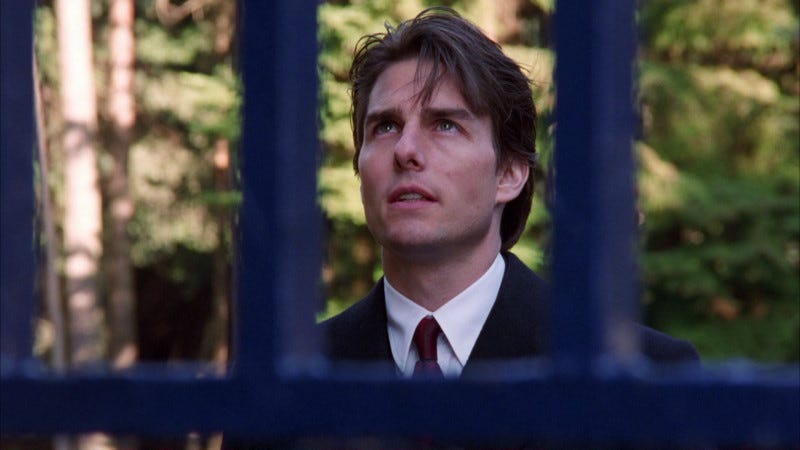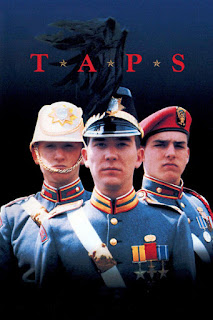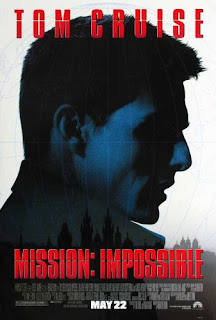Eyes Wide Shut (1999)
Admittedly, it took me a very long time (a year, in fact) to get myself ready to rewatch Eyes Wide Shut. The idea of giving my thoughts on a Stanley Kubrick film when people have already said so much about them was daunting, but it becomes even more daunting when it's his final film -- and one that people absolutely adore to theorize about. Eyes Wide Shut is a peculiar film indeed, one full of motifs and symbolism that can be interpreted in a myriad of ways. So I'll take a swing at it, too.
At the most surface level interpretation, this is a movie about sex and marriage. Bill Hartford, Tom Cruise's character, becomes consumed with the realization that his wife, Alice, played by Nicole Kidman, has fantasized about having sex with other men. Over the next two and a half hours, Bill meanders through the streets of New York, continuously running into chances to have an affair, but ultimately resisting every time.
However, this film is particularly infamous for one scene in particular, and that would be the scene where Bill travels to a mansion where masked party-goers have a ritualistic orgy. This orgy is what spawned theories of this movie being one about the occult and secret societies, and that it was so powerful that it resulted in Kubrick's death before it was even released. However, if that were the case, one would think that organizations powerful enough to view this film before release and then kill Kubrick would also be able to prevent this movie from coming out. Plenty of films are canned or shelved before release, and Eyes Wide Shut, with his record long filming time, would have been an understandable victim.
To get a clearer picture of what this movie is intending, we have to return to the book it's based off of. In 1926, the novella Traumnovelle was published by Arthur Schnitzler. Surprisingly, Eyes Wide Shut is incredibly faithful to the original story, with most of its changes coming from adding extra substance (like creating a character that serves as a liaison between Bill's world and the world of the orgy at the mansion) and adapting it from Austria in the early 20th century to the United States in the 1990s. However, there is one key change that primarily drives my interpretation of this film, and it comes from the fact that Dr. Fridolin, the original name of Bill's character, is Jewish in the book.
Kubrick was so adamant on erasing the fact that he's Jewish that I believe it's at least part of the reason the film is set around Christmastime. I don't think he did this for antisemitic reasons; rather, it's because he wanted to emphasize another part of Bill's character. See, in the novel, Dr. Fridolin is harassed on the street for being a Jew; in the film, Bill is harassed on the street by a group of young men who call him homophobic slurs.
This one scene, at least in my opinion, is the true base for the rest of the film. That is, Bill Hartford is a man uncertain in his sexual orientation. He has a wife and a daughter, and he should be happy with that. Never has he fantasized about other women, and no matter how hard he tries, he is sexually unavailable to them. His career as a doctor demonstrates the way he views bodies as scientific and unerotic, and Kubrick constantly highlights this by having naked women strewn throughout the film in the least sexiest way imaginable.
I have seen people make the claim that the recurring rainbows in this film can also be a symbolic representation of Bill as a gay man, something which I do agree with, but it feels so base-level that I only wanted to briefly mention it. And I also say that he's hesitant in his sexual orientation, and not that he's just gay, because I think it's safe to interpret him as either gay or asexual in his struggle to be sexually intimate with anyone else. Even at the orgy scene, there is a gay couple and a lesbian couple dancing together, and Bill walks past them with the same indifference as he walked past everyone else.
Now, as someone who is gay, I don't think this entirely means he isn't gay, which is why I'm giving the option of him as a gay man or an asexual one. His lack of understanding when a male receptionist at a hotel (played by Alan Cumming) is blatantly flirting with him could be a reflection of his lack of understanding of his sexual orientation, or perhaps a damning piece of evidence of it -- hence why I believe both interpretations are correct.
Of course, this is not to say that Traumnovelle was intending for this to be a story about sexual orientation. After all, Dr. Fridolin's Jewishness does seem to be a large component of the story, and German-speaking Jews in the 1920s certainly were facing a lot of rising tensions and societal discrimination, to say the very, very least. But the wonderful thing about adaptations of stories is that creators are able to change meanings and themes to apply to their context, and in a country where the drug cocktail to treat AIDS patients was released just years earlier, the story of a closeted gay man who views sex as ominous and confusing is pertinent, at least to me.
As for Tom Cruise's performance, it's very good. Not my personal favorite, but still demonstrative of his skills as an actor. His weariness seems genuine, and that's most likely because Kubrick ran him through the wringer throughout the filming of this movie. My favorite way to describe this movie to people is to say, "Watch Tom Cruise's and Nicole Kidman's marriage dissolve in real time!" because that's essentially what this movie was. Reportedly, Kubrick kept Cruise and Kidman away from each other during filming and repeatedly hounded them with deeply personal questions about themselves and their marriage for hours at a time. In addition to that, Andrew Morton claims in his biography on Cruise that members from the Church of Scientology were meddling with their relationship for independent reasons as well by instilling beliefs that Kidman was having affairs. I don't wish to speculate further, as this is a review of a film and not a gossip blog post, but needless to say, it adds a definite air of genuineness that makes this uncomfortable to watch, at times.
Rating: 4.25/5 - June 17, 2021





Comments
Post a Comment